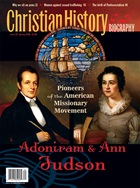Political, cultural, and media elites are increasingly raising alarm over what has become one of the world's largest illegal commercial sectors—the trade in human beings. The U.S. Government estimates that 600,000 to 800,000 men, women, and children are trafficked across international borders each year. Of these approximately 80 percent are women and girls, and the majority of victims are trafficked for purposes of commercial sexual exploitation. President George W. Bush denounced the phenomenon in his historic speech before the United Nations in 2002, and as recently as December 2005, the U. S. Congress passed the Trafficking Victims Protection Reauthorization Act to improve upon and expand existing anti-trafficking laws.
Today's movement for the abolition of sexual trafficking is a rekindling of an earlier crusade. In the late 19th century, reformers such as Josephine Butler, Florence Soper Booth, Katharine Bushnell, and many others fought to protect "the down-trodden mass of degraded womanhood." They were the William Wilberforces of their day, battling another form of slavery and working for the restoration of its victims.
Josephine Butler (1828-1906)
Public policy crusader
Described by contemporaries as "touched with genius" and "the most distinguished woman of the Nineteenth Century," Josephine Butler launched the first international anti-trafficking movement on behalf of prostituted women. Born into the prominent family of John Grey, a slavery abolitionist and cousin to a prime minister, Josephine was raised in a household that was politically influential, deeply religious, and characterized by a sense of social responsibility and "fiery hatred of injustice." In 1852 she married George Butler, a respected scholar and cleric. The death of their only daughter, Eva, in 1863, led Butler to seek solace by ministering to people with pain greater than her own.
Against the advice of family and friends, Butler began by visiting Liverpool's Brownlow Hill workhouse. There she encountered destitute, desperate, and "criminal" women, including unwed mothers and prostitutes—those whom society viewed as beyond hope of restoration. Undaunted by cultural norms, Butler visited these women, built friendships with them, and ultimately began offering former prostitutes refuge in her own home. While also campaigning for women's suffrage and higher education, in 1867 she founded the "House of Rest," a home to rescue those in danger of falling into prostitution.
But the great crusade of Butler's life was her fight against the 1864 Contagious Diseases Acts (CDA), the first of a series of acts that legalized prostitution in several of England's towns where military troops were garrisoned. Butler rightly viewed this as government-sanctioned enslavement of women and argued that the CDA rendered them "no longer women, but only bits of numbered, inspected, and ticketed human flesh, flung by Government into the public market." In 1869, she helped found the Ladies' National Association for the Repeal of the Contagious Diseases Acts (LNA). Under her direction, the LNA relentlessly led petition drives and processions, published pamphlets and monthly newsletters, sponsored political candidates, and garnered the support of such well-known figures as Florence Nightingale and Victor Hugo. Eventually, Butler's campaign for abolition spread to the European continent and led to the formation of the International Abolitionist Federation, which she helped establish.
Butler was unique in her day. Instead of pouring out moral outrage on those who were caught up in prostitution by force, fraud, or economic necessity, she reserved her wrath for those who tolerated prostitution and engineered its expansion. She understood that lack of education and work opportunities drove more women into prostitution "than any amount of actual profligacy." She insisted on the humanity of those caught up in the sex trade: "When you say that fallen women in the mass are irreclaimable, have lost all truthfulness, all nobleness, all delicacy of feeling, all clearness of intellect, and all tenderness of heart because they are unchaste, you are guilty of a blasphemy against human nature and against God." Moreover, she rocked the social norms of her time, not only because she spoke about the shameful subject of prostitution, but because she dared to address audiences of men at a time when women were expected to be silent regarding public affairs.
Butler saw her campaign as analogous to that of abolitionists like William Wilberforce and her father, who a generation before had fought against the African slave trade in the British Empire. She cleverly criticized the CDA's existence with this question: "Shall the same country which paid its millions for the abolition of negro slavery now pay its millions for the establishment of white slavery [the Victorian-era euphemism for sexual trafficking] within its own bosom?"
The CDA were not repealed until 1886, but by then Butler had already succeeded in revolutionizing the role of women in politics and elevating countless women, viewed by most as "the sewers of society," to places of safety and positions of dignity and respect.
Katharine Bushnell (1855-1946)
Secret investigator
As Butler began to take a lesser role in abolitionist activities due to stress, age, and poor health, an American missionary named Katharine Bushnell stepped in and extended the campaign for abolition from the U.K. and the European continent to India.
Trained as a doctor, Bushnell spent her early years after medical school serving as a medical missionary to China. After a serious injury forced her to return to the U.S., Bushnell found new purpose by serving as the national evangelist of the Department of Social Purity, an arm of the Women's Christian Temperance Union that worked for the abolition of prostitution and the restoration of "fallen women." She quickly helped establish the Anchorage Mission in Chicago, which provided refuge and care for up to 5,000 women and girls each year, and advised other local WCTU chapters about establishing similar missions.
Bushnell's efforts shifted in 1888. After reading a number of reports about a "white slave trade" developing in response to the demand for commercial sex in northern Wisconsin lumber camps, she decided to undertake her own investigation. In response to her efforts and those of the local WCTU, the Wisconsin Senate passed the so-called "Kate Bushnell Bill" which addressed some of the abuses against women that she discovered and exposed.
Meanwhile, across the Atlantic, another saga was unfolding. In June 1886, the British Quarter-Master-General of the Indian government issued a memo stating that sufficiently attractive and medically inspected prostitutes were to be provided for the men of the British army. However, repeal of the CDA earlier that year prohibited such practices. The memo became public, and in the uproar that followed, Lord Roberts, the Commander-in-Chief of the forces of India, wrote to Josephine Butler claiming that the reports from India were exaggerated.
Butler hoped to expose the truth. She found the means of doing so in the young American who had recently written to her offering assistance—none other than Katharine Bushnell. In 1891, the WCTU sent Bushnell and Elizabeth Andrew on a worldwide evangelizing tour in the interests of temperance and social purity. Their first stop was England, where Butler, Bushnell, and Andrew met to plan a secret investigation into regulated prostitution in India.
Bushnell and Andrew arrived in India in December. In three months, they traveled more than 3,600 miles, visited 10 military stations, and interviewed 395 prostitutes as well as numerous medical personnel and patients at hospitals where prostitutes with sexually transmitted diseases were detained. Their investigation revealed that there were women called mahaldarnis who acted as procuresses on behalf of the military and also trained inexperienced girls. Procured girls and women were given "registration tickets" as proof that they had been examined by a medical officer and were permitted to provide sex to British soldiers without fear of contaminating them. Bushnell also found that some of the prostitutes, as young as eleven years old, were actually the children of British soldiers left behind when a soldier's tour of duty was over.
The report Bushnell sent to Butler eventually appeared in British newspapers, and Bushnell was called to appear before a committee appointed by Prime Minister Gladstone to investigate the matter. The committee confirmed Bushnell's findings: The British military had violated the repeal of the CDA. Lord Roberts was given a severe reprimand and forced to apologize, and there was, at least for a brief time, a stop to the British military's regulation of prostitution in India.
Bushnell became involved in other crusades, including promoting a ban of opium trade in the Orient, writing a history of "yellow" slavery in Hong Kong and China, and campaigning against the sex trafficking of women in San Francisco's Chinatown. In her later years, she wrote Bible studies. Despite her incalculable contribution to the abolitionist cause, she is best known for her important book, God's Word to Women.
Florence Booth (1861-1957)
Besieger of the streets
During the 1880s, the Salvation Army joined Butler in the movement to rescue and restore "fallen women." While it engaged in both advocacy and investigative efforts, the Salvation Army's largest contribution to the cause was its development of social services for survivors and at-risk women and girls.
The Salvation Army's involvement began at the urging of Florence Soper Booth, wife of Bramwell Booth and daughter-in-law to Salvation Army co-founders William and Catherine Booth. In 1881, another Salvationist named Elizabeth Cottrill started opening her home to women seeking to escape street life. From those who found refuge there, Florence heard appalling stories of young girls being sexually trafficked.
Florence was greatly troubled and shared this information with her husband. Initially believing the stories were exaggerated, Bramwell began investigating them for himself and consulted, among others, Josephine Butler. But prima facie evidence arrived early one morning in the form of a young girl in a fine red dress waiting at the front gate of the Salvation Army headquarters. The girl had been lured to London under the false pretenses of a job, but found herself in a brothel instead. She managed to escape her captors and made her way to the address printed in a Salvation Army songbook she had brought with her from home.
This and other events propelled the Salvation Army into the forefront of the movement to protect women and girls from sexual trafficking. William Booth proposed a "New National Scheme for the Deliverance of Unprotected Girls and the Rescue of the Fallen." Of his scheme he said, "If it can be matured and got into operation on the scale here described, I believe it will constitute one of the most effective onslaughts on one of the blackest strongholds of the devil, and be a means of rescuing tens of thousands of the most despairing and wretched victims of his fiendish designs." The Salvation Army also formed Midnight Rescue Brigades, which went at night to the back alleys, cellars, and attics where they might find women and girls longing for another life. Catherine Booth commented, "I felt as though I must go and walk the streets and besiege the dens where these hellish iniquities are going on. To keep quiet seemed like being a traitor to humanity."
And besiege they did. Home after home was opened for young girls in danger and those who had been "ruined and forsaken but who are opposed to leading an immoral life." Florence Soper Booth was put in charge of these facilities and what ultimately became the Salvation Army's Women's Social Services. In 30 years time, the number of Salvation Army rescue homes grew from one in Whitechapel to 117 homes in Great Britain and around the world.
Lisa Thompson is the Liaison for the Abolition of Sexual Trafficking at the Salvation Army, U.S.A., National Headquarters.
Copyright © 2006 by the author or Christianity Today/Christian History & Biography magazine.
Click here for reprint information on Christian History & Biography.

Support Our Work
Subscribe to CT for less than $4.25/month





























